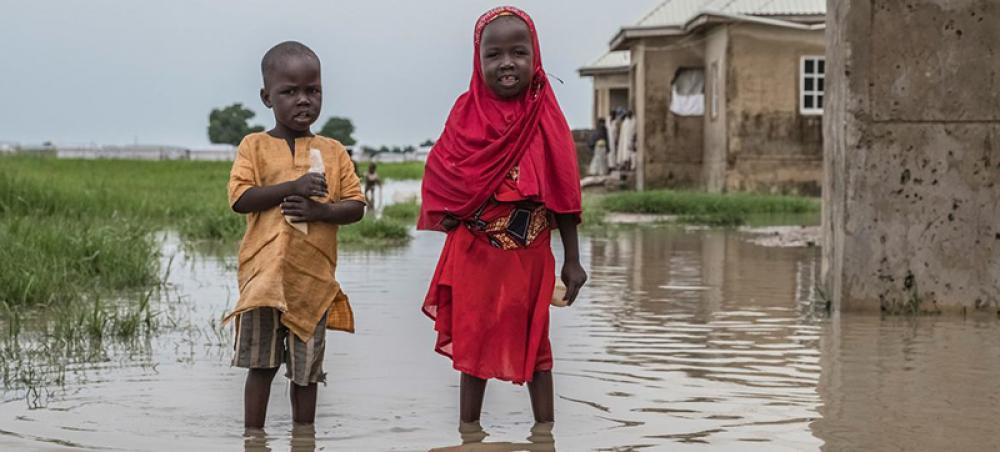Just Earth News | @justearthnews | 22 Oct 2022, 02:28 am Print
 Nigeria Floods
Nigeria Floods Image: UNICEF/Vlad Sokhin
New York: More than 2.8 million people have been impacted by Nigeria’s worst floods in a decade, with 1.3 million displaced and hundreds of lives lost, said the UN chief on Friday, expressing his sadness at the devastation.
Infrastructure and farmland have also been damaged, said the statement issued on behalf of Secretary-General António Guterres, worsening the cost of living across the country.
He extended his deepest condolences to the Government of Nigeria and to the affected families, reiterating the UN’s continuing “commitment to supporting the Government of Nigeria in this challenging time.”
UN Children’s Fund, UNICEF, said that 60 per cent of those in need were children, who are at increased risk of waterborne diseases, drowning and malnutrition.
The floods have affected 34 out of the 36 states in the country, and over 600 people have lost their lives, with 200,000 houses either partially or fully damaged.
In the northeastern states of Borno, Adamawa and Yobe, a total of 7,485 cases of cholera and 319 associated deaths were reported as of 12 October, and rains are expected to continue for several weeks, along with rising humanitarian needs.
‘Extremely vulnerable’
“Children and adolescents in flood-affected areas are in an extremely vulnerable situation,” said Cristian Munduate, UNICEF Representative in Nigeria.
"They are particularly at risk of waterborne diseases and emotional and psychological distress. UNICEF is working closely with the Government and other partners to provide life-saving assistance to those who are most in need.”
Immediate priority needs for children include health, water, sanitation, and hygiene; as well as shelter and food.
Humanitarian needs ‘rising fast’ in Burkina Faso: Griffiths
UN Emergency Relief Coordinator, Martin Griffiths, ended a short fact-finding mission to nearby Burkina Faso on Friday, saying it was a critical time for the landlocked West African nation.
Tweet URL
“Humanitarian needs are rising fast. A quarter of the population, or some 4.9 million people need emergency assistance, a staggering 40 per cent more people than at the beginning of the year”, he said. “One in ten Burkinabe is displaced from their homes by devastating conflict and climate shocks.”
Growing insecurity from extremist armed groups operating across much of the Sahel, and blockades in many areas have left communities isolated, and with inadequate supplies of humanitarian aid.
“To provide critical life-saving relief to those in need with a level of dignity and respect that every human being deserves, we urgently require additional resources. Our US$805 million response plan in Burkina Faso is less than a third funded.”
Diet of leaves and salt
Relief chief Griffiths said he’d met some displaced in the town of Djibo, who had eaten “only leaves and salt, for weeks.”
“The situation is so bad that women are risking their lives, crossing lines of control at night in search of food. I spoke with community leaders who urged those in charge to open roads for food, water, and vital medicine to reach them, to save lives. There are peaceful initiatives to find solutions and there is still hope. The people of Djibo deserve our respect, admiration and much more support in this hour of dire need.”
He also met the new military leader of Burkina Faso, Ibrahim Traoré, who was sworn in on Friday vowing to defeat terrorism in the north, replacing a former coup leader who seized power in January.
Mr. Griffiths said he had stressed the need for protection of civilians, including for those caught up in conflict, and asked the transitional president to ensure “a conducive environment for humanitarian operations and enable humanitarian access, so that we can reach all Burkinabé in need, everywhere across the country.”
In the first nine months of this year, the UN and our humanitarian partners brought food assistance to 1.8 million people and supported 740,000 people with access to healthcare in areas where health facilities have closed down and where medical supplies are lacking.
- Viral Irish food bank photo sparks shocking racist attacks on Indians
- Caught on camera: Two foreigners assaulted in Israel in an alleged racial attack
- Pakistan: Parents heartbroken after court sides with man accused of kidnapping minor Christian girl
- Pakistan: Trafficked 35 years ago, Bangladesh-born woman approaches court against FIA for offloading her from flight!
- Hindu tea worker found bound and bloodied in Bangladesh garden during general elections; investigation underway





-1763561110.jpg)
